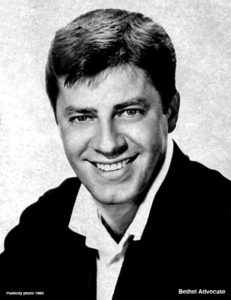
Report by Paula Antolini
August 20, 2017 4:47PM EDT
King of Comedy, Jerry Lewis, 91, Passed Away Aug. 20th
Screen legend Jerry Lewis passed away at the age of 91 on Sunday, The Hollywood Reporter reported.
On Sunday, Lewis’ family issued a statement to the Las Vegas Review-Journal announcing that the legendary entertainer passed away at 9:15 a.m. at home in Las Vegas.
How Jerry Lewis died was reportedly from natural causes, according to his family’s statement. However, the comedian has faced many health struggles in the past.
*****
OBITUARY
Jerry Lewis
In 1946, a young comedian, Jerry Lewis, met a struggling singer, Dean Martin. They decided to form a team, Martin and Lewis, and the rest, as they say, is history. Their act, with its elaborate pattern of sparring and interruption, turned them into a success on the nightclub circuit – and on television, then establishing its hegemony over American popular entertainment.
Before long they were in Hollywood, under the sharp entrepreneurial aegis of the Paramount producer Hal Wallis. Between 1949 and 1956, they starred in more than a dozen movies, with Martin as the worldly philanderer and Lewis the gormless hanger-on. The humour may have been unsophisticated, but Wallis knew better than to skimp on the production values, and the duo became a box-office success.
Lewis, who has died aged 91, was steeped in show business. His parents, Daniel and Rae Levitch, were entertainers (using the surname Lewis on stage) and from an early age Jerry (born in Newark, New Jersey) would join them at resort hotels during the summer. By the age of 18, he was established in a small way as a standup comic – his act, significantly enough, featured mimicry of better known performers – and not long afterwards he met Martin.
Several of Martin and Lewis’s films were loose remakes of earlier Paramount comedies (Scared Stiff, 1953, for instance, derived from The Ghost Breakers, 1940), with Lewis in roles equivalent to those of the leading ladies in the originals: the fact that this could be accomplished so readily is a measure of the films’ essential innocence.
When Martin and Lewis parted professional company, reputedly in a spirit of mutual resentment, both went on to successful solo careers. Lewis’s first few films on his own were routine mixtures of slapstick and somewhat mawkish sentiment, but in 1960 he opted to write and direct, as well as star in, The Bellboy, a startlingly surreal, and all but plotless, account of the travails of a dysfunctional individual at the mercy of modern living.
Established on a new footing, Lewis proceeded over the next several years to alternate performing in vehicles made by other directors with directing and producing, and often writing, his own. In the former category, the most rewarding pictures stemmed from Lewis’s collaboration with Frank Tashlin, an ex-cartoonist and gagman.
Such films as Who’s Minding the Store (1963) and The Disorderly Orderly (1964) draw on the cartoon precepts of Tashlin’s past to create a fantasticated modern age in the grip of faddishness and technology. The most personal of the films Lewis directed himself, The Nutty Professor (1963) and The Patsy (1964), reflected similar concerns, but internalised them in the figure of the star-protagonist.
The Nutty Professor, a conspicuously well crafted picture, was a reworking of Dr Jekyll and Mr Hyde, in which the Jekyll is a nerdish chemistry teacher and the Hyde is Buddy Love, a womanising singer whom many at the time assumed was meant as a malign parody of Martin, though in later years Lewis was at pains to deny this and to maintain that his feelings for Martin were warm. The Patsy, a slapstick satire on Hollywood star-making, is overtly Pirandellian in form, and ends on the set of its own production, with Lewis emerging from behind the camera to offer advice to a fellow performer.
By the late 1960s, however, Lewis seemed to be losing his way. Whatever critical following he might have had from a small coterie, the mass audience which had hitherto underwritten his efforts showed signs of fading away as family movie-going disappeared. Lewis broke his longtime link with Paramount, and, as a freelance, recognising that he was getting older, sought to distance himself from the post-adolescent “nerd” figure who had been his mainstay.
Thus, in Three on a Couch (1966), he moved some distance towards traditional romantic comedy, while Which Way to the Front? (1970) cast him as an eccentric millionaire who during the second world war seeks to raise his own private army. In 1972, Lewis tried to go considerably further beyond his past range with a comedy set in Nazi Germany and confronting the Holocaust. The Day the Clown Cried was never released, and the only surviving print was acquired in 2015 by the US Library of Congress.
During the 1970s, Lewis’s career faltered, as did his health, though he gained a new kind of celebrity as front man of an annual US TV “telethon” to raise funds for combating muscular dystrophy – a function for which he was insistent that he should not be paid and which he continued to fulfil until 2010. In 1980 he directed a further personal film, Hardly Working, which won high praise from devotees in France, where he was accorded the accolade of “le Roi du Crazy”, but generally remains an unknown quantity.
However, in 1982, Martin Scorsese cast him, paradoxically, in the straight role of a celebrated comedian in The King of Comedy. Lewis’s performance as the victim of an obsessive fan (Robert De Niro) was a triumph of precise observation and received wide acclaim. Subsequently he appeared in acting roles in several offbeat movies, including Arizona Dream (1993) and Funny Bones (1995), though without fully recapturing the effect of his performance for Scorsese.
In 1995 he made a further new departure by appearing in a Broadway revival of the musical Damn Yankees – in the guise, of all things, of a latterday Mephistopheles, gloating with macabre glee, in the song Those Were the Good Old Days, over assorted tragedies of history. His virtuoso performance stole the show, which subsequently went on tour and in which he had a limited run in the West End of London in 1997. His success in the role offered definitive proof that he had transcended the “nerd” persona to which he had once seemed almost perversely to cling.
In 2009, he received the Jean Hersholt humanitarian award at the Oscar ceremony, and later that year announced that he would return to the screen in the title role of the film Max Rose. The film premiered at the Cannes film festival in 2013, and received a limited release in the US last year.
Lewis is survived by his second wife, SanDee Pitnick, whom he married in 1983, and their daughter; and by five sons from his first marriage, to Patti Palmer, which ended in divorce. Another son predeceased him.
•Jerry Lewis, comedian, actor and film-maker, born 16 March 1926; died 20 August 2017
###


Leave a Reply